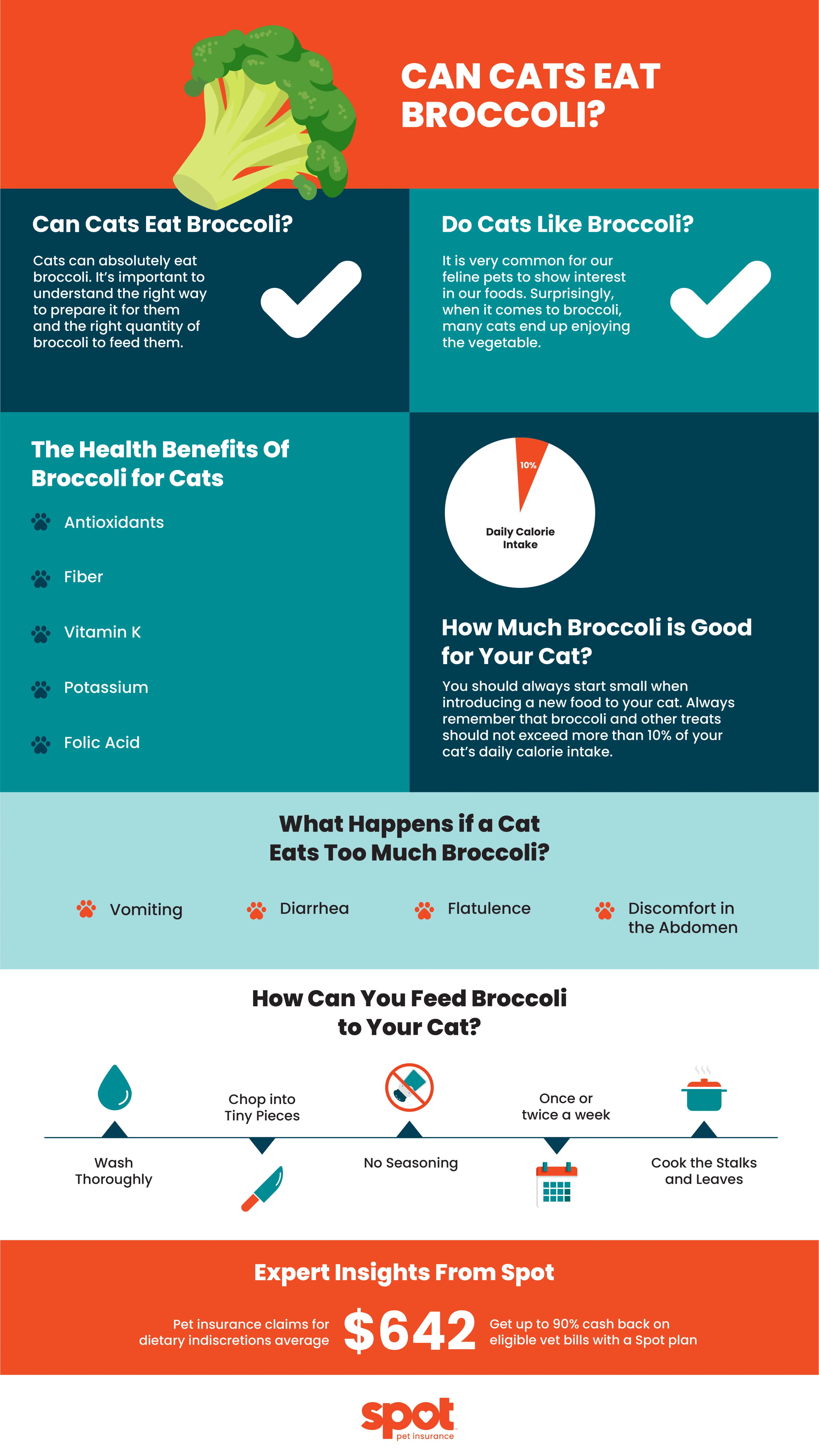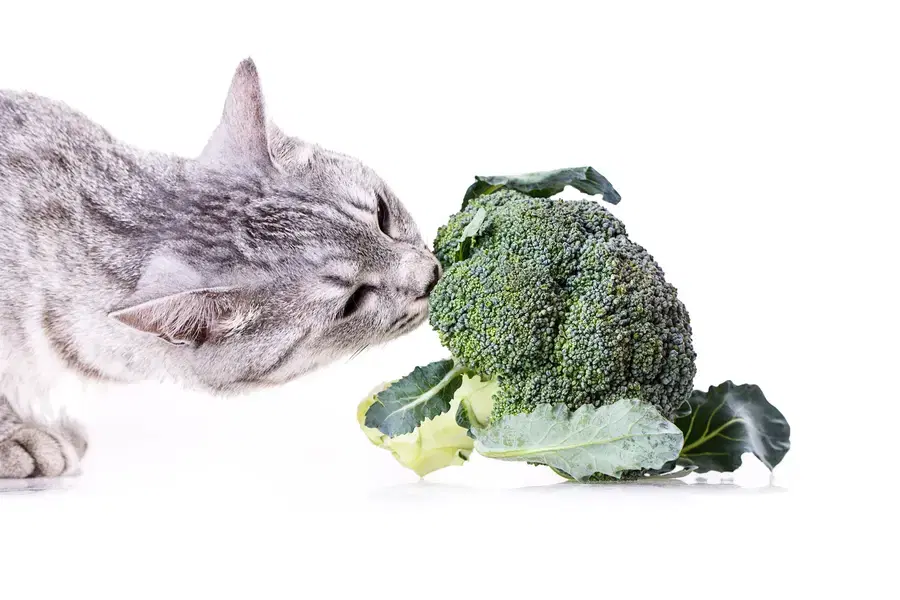Broccoli, a popular vegetable used in a variety of dishes worldwide, is a member of the cabbage family and is known for its superior health benefits. Broccoli can compliment almost any ingredient, be it chicken, cottage cheese, or pasta, and can even be enjoyed alone.
If we consider its health benefits, it would only be fair to call broccoli a superfood. But does it offer these same benefits to cats?

Can Cats Eat Broccoli?
Cats can absolutely eat broccoli. But before going ahead and placing a big bowl full of broccoli in front of your cat, it’s important to understand the right way to prepare it for them and the right quantity of broccoli to feed them.
Is Broccoli Good for Cats?
Yes, broccoli can offer a variety of health benefits to cats. That being said, cats are carnivorous in nature, so they shouldn’t eat fruits or vegetables daily. Many vegetables are toxic to cats, but broccoli is among the few that are considered safe for cats to consume.1
Broccoli is packed with vitamins, minerals, bioactive compounds, and antioxidants. One cup of broccoli (around 90 grams) consists of the following –2
Carbs: 5.6 grams
Protein: 2.3 grams
Fat: 0.3 grams
Fiber: 2.2 grams
Vitamin C: 91% of the recommended Daily Value (DV)
Vitamin K: 77% of the DV
These nutrients can help in reducing the risk of cancer, boost immunity, improve skin health, reduce the risk of diabetes, and offer a range of other benefits. These are the benefits of broccoli when eaten by humans, but in moderation, broccoli can prove to be a healthy treat for cats as well.
The Health Benefits Of Broccoli for Cats
Broccoli contains antioxidants, fiber, vitamin K, folic acid, and potassium. Let’s break down the nutrient values in broccoli and evaluate the benefits they offer for cats -3
Antioxidants - Antioxidants play a key role in minimizing damage to cells, including cells of the immune system, caused by free radicals.
Fiber - Helps with digestive functions and benefits the stool quality of cats. It also helps in cases of constipation, diarrhea, diabetes, and even obesity.
Vitamin K – It helps the body form clots and prevent bleeding after an injury occurs.
Folic Acid – Is needed to form healthy red blood cells.
Potassium - Is required for the normal function of muscles and bodily systems.
Eating broccoli may even help your cat lose weight because it can replace high-fat, high-carb treats.
Do Cats Like Broccoli?
It is very common for our feline pets to show interest in our foods. Surprisingly, when it comes to broccoli, many cats end up enjoying the vegetable, despite the pungent scent that can come from it.
How Much Broccoli is Good for Your Cat?
You should always start small when introducing a new food to your cat. Start with a piece as small as your fingernail and watch for any signs of an allergic reaction or upset stomach. If your cat doesn’t display signs of either, you can give them a few more small pieces of broccoli to enjoy.
Always remember that broccoli and other treats should not exceed more than 10% of your cat’s daily calorie intake. When it comes to broccoli, don’t just go off of the calorie intake. Broccoli is high in fiber which can cause digestive issues if too much is ingested. The recommended amount of broccoli for a cat is one teaspoon of chopped broccoli per serving, and only once or twice a week.1
How Can You Feed Broccoli to Your Cat?
Before offering any broccoli to your cat or adding any to their food bowl, you need to prepare it for them. Here are a few tips on how to do this:
Wash the broccoli thoroughly – You don’t want any dirt or pesticides to enter your cat’s digestive tract, so make sure to wash the broccoli thoroughly before cooking it.
Chop the Broccoli into tiny pieces – Due to the crunchy nature, broccoli can sometimes be a choking hazard. It is advisable to chop it into tiny pieces before serving any to your cat.
Single floret cooked and chopped –Yes, there are many broccoli dishes out there but the best one for your cat is steamed or boiled and nicely chopped, without any type of seasonings like garlic, onions, or oils.
Once or twice a week – While broccoli can be beneficial for your cat’s health, stick to the recommended quantity and limit the treat to not more than twice a week.
Cook the stalks and leaves – These are considered safe for your cat as well.1 But do not let your cat eat them raw as they can be very difficult to digest. Cook them to ensure they are soft enough.
What Happens if a Cat Eats Too Much Broccoli?
If your cat manages to eat more broccoli than they should, keep an eye out for the following symptoms of an upset stomach. You should contact your vet right away if you see –
Diarrhea
Discomfort in the abdomen
Flatulence
Are There Any Cats That Should Not Eat Broccoli?
Some cats, not specific to any breed, can be more susceptible to getting an upset stomach from eating broccoli. For them, broccoli should altogether be eliminated from their diets. The list can include –
Cats with allergies or food intolerances – If your cat is known to be allergic to other vegetables, it’s recommended that you don’t try to add broccoli to their diet.
Cats with digestive issues – Cats with a history of gastroenteritis, inflammatory bowel disease (IBD), or digestive lymphoma may have sensitive digestive systems. It is better to avoid adding any new foods to their diet.
Cats with thyroid problems – Broccoli is a cruciferous vegetable, which means it contains goitrogenic compounds that can interfere with the normal functioning of the thyroid gland if eaten in excess.
Expert Insights From Spot
While it may be tempting to share our favorite foods with our pets, it's crucial to remember that not all human foods are safe for our pets. Spot's internal data reveals that pet insurance claims for dietary indiscretions average $642*, underscoring the importance of caution and proper research before offering snacks to your pet.
How Spot Pet Insurance Can Help
At Spot Pet Insurance, we know that unexpected accidents and illnesses can happen at any time. That’s why Spot offers accident and illness and accident-only plans that offer pet parents up to 90% cash back on eligible veterinary bills. Spot’s plans are customizable so you can create a plan that best fits the needs of your pet and your budget. Choose your deductible, annual limit, and reimbursement rate from a range of options. Get a free quote today!
Conclusion
In summary, broccoli is a superfood that can offer a range of benefits to your cat. Just make sure to prepare it for them and stick to one teaspoon per serving, once or twice a week. Making broccoli an occasional treat for your cat may be a good idea and could be recommended, given that your cat does not have a history of allergies, digestive issues, or thyroid problems.

As Spot’s resident cat enthusiast, I am dedicated to researching and sharing information that helps pet owners take the best care of their pets. Pet ownership comes with it’s share of challenges, but my goal is to help make this journey easier.
*Jan 2019 to Aug 2024 Spot Pet Insurance Services, LLC claims data.
Ingraham, Leslie. “Can Cats Eat Broccoli?” Wag Walking, 10 Aug. 2022, wagwalking.com/wellness/can-cats-eat-broccoli#do-cats-like-broccoli.
Bjarnadottir, Adda. “Broccoli 101: Nutrition Facts and Health Benefits.” Healthline, 28 Feb. 2023, www.healthline.com/nutrition/foods/broccoli.
Cosgrove, Nicole. “Can Cats Eat Broccoli? Vet-Reviewed Benefits & Other Healthy Treats.” Hepper, 27 Aug. 2024, www.hepper.com/can-cats-eat-broccoli/.
The information presented in this article is for educational and informational purposes only and does not constitute or substitute for the advice of your veterinarian.












